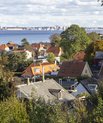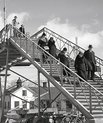Norbert Götz
Norbert Götz, PhD, is Professor at the Institute of Contemporary History at Södertörn University, Sweden. He has a wide range of interests including political culture, international relations, democracy, welfare state, nationalism, peace and conceptual history, and you can read more about him here. He is also Södertörn University's representative on the board of Reimagining Norden in an Evolving World (ReNEW): An Excellence Hub in Research, Education and Public Outreach funded by Nordforsk of which nordics.info is a part.







